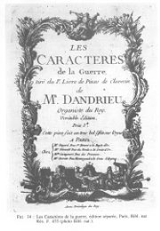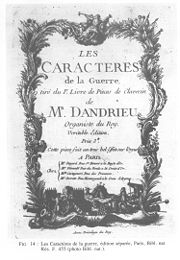
Jean-François Dandrieu
Encyclopedia
Jean-François Dandrieu was a French Baroque
composer
, harpsichord
ist and organist
.
 He was born in Paris into a family of artists and musicians. A gifted and precocious child, he gave his first public performances when he was 5 years old, playing the harpsichord for Louis XIV, King of France, and his court. These concerts marked the beginning of Dandrieu's very successful career as harpsichordist and organist. He was a student of Jean-Baptiste Moreau
He was born in Paris into a family of artists and musicians. A gifted and precocious child, he gave his first public performances when he was 5 years old, playing the harpsichord for Louis XIV, King of France, and his court. These concerts marked the beginning of Dandrieu's very successful career as harpsichordist and organist. He was a student of Jean-Baptiste Moreau
. In 1705 he became titular organist of the Saint-Merry church in Paris (a post previously occupied by Nicolas Lebègue
). At some point in 1706 he was a member of the panel of judges who examined Jean-Philippe Rameau
's skills in order to decide whether he could be appointed organist of the Sainte-Madeleine en la Cité church. In 1721 he was appointed one of the four organists of the Chapel Royal of France. He died in Paris in 1738.
The works published during his lifetime include the following collections:
A volume of organ pieces was published posthumously in 1739 and contained, among other works, some pieces by the catholic
priest
and organist
Pierre Dandrieu, Jean-François' uncle. Dandrieu also published an academic treatise on accompaniment (Principes de l'accompagnement) in 1718, which now serves as an important source of information on the musical practice of the era.
Dandrieu's harpsichord writing is reminiscent of that of François Couperin
, but with more effective use of counterpoint
, which reminds one of the German Baroque music. The strict traditional suite "à la Froberger
" is abandoned in his works, many dance movements replaced with the so-called pièces de caractère, pieces with descriptive titles that were common in French music of the 18th century. Dandrieu's harpsichord oeuvre is, after those of François Couperin and Jean-Nicolas Geoffroy
, the most important in terms of sheer quantity of pieces.
Baroque
The Baroque is a period and the style that used exaggerated motion and clear, easily interpreted detail to produce drama, tension, exuberance, and grandeur in sculpture, painting, literature, dance, and music...
composer
Composer
A composer is a person who creates music, either by musical notation or oral tradition, for interpretation and performance, or through direct manipulation of sonic material through electronic media...
, harpsichord
Harpsichord
A harpsichord is a musical instrument played by means of a keyboard. It produces sound by plucking a string when a key is pressed.In the narrow sense, "harpsichord" designates only the large wing-shaped instruments in which the strings are perpendicular to the keyboard...
ist and organist
Organ (music)
The organ , is a keyboard instrument of one or more divisions, each played with its own keyboard operated either with the hands or with the feet. The organ is a relatively old musical instrument in the Western musical tradition, dating from the time of Ctesibius of Alexandria who is credited with...
.

Jean-Baptiste Moreau
Jean-Baptiste Moreau was a French composer of the baroque period. He served as the master of music at the court of Louis XIV. His compositional output includes several motets and music for the theatre.-Life and career:...
. In 1705 he became titular organist of the Saint-Merry church in Paris (a post previously occupied by Nicolas Lebègue
Nicolas Lebègue
Nicolas Lebègue was a French Baroque composer, organist and harpsichordist. He was born in Laon and in 1650s settled in Paris, quickly establishing himself as one of the best organists of the country. He lived and worked in Paris until his death, but frequently made trips to other cities to...
). At some point in 1706 he was a member of the panel of judges who examined Jean-Philippe Rameau
Jean-Philippe Rameau
Jean-Philippe Rameau was one of the most important French composers and music theorists of the Baroque era. He replaced Jean-Baptiste Lully as the dominant composer of French opera and is also considered the leading French composer for the harpsichord of his time, alongside François...
's skills in order to decide whether he could be appointed organist of the Sainte-Madeleine en la Cité church. In 1721 he was appointed one of the four organists of the Chapel Royal of France. He died in Paris in 1738.
The works published during his lifetime include the following collections:
- Livre de sonates en trio, trio sonataTrio sonataThe trio sonata is a musical form that was popular in the 17th and early 18th centuries.A trio sonata is written for two solo melodic instruments and basso continuo, making three parts in all, hence the name trio sonata...
s (1705) - Two Livres de sonates à violon seul, sonatas for solo violinViolinThe violin is a string instrument, usually with four strings tuned in perfect fifths. It is the smallest, highest-pitched member of the violin family of string instruments, which includes the viola and cello....
(1710 and 1720) - Les caractères de la guerre, instrumental concerts (1718, a revised version published in 1733)
- Three little harpsichord collections (1705) and three great ones (1724, 1728 and 1734)
A volume of organ pieces was published posthumously in 1739 and contained, among other works, some pieces by the catholic
Catholic
The word catholic comes from the Greek phrase , meaning "on the whole," "according to the whole" or "in general", and is a combination of the Greek words meaning "about" and meaning "whole"...
priest
Priest
A priest is a person authorized to perform the sacred rites of a religion, especially as a mediatory agent between humans and deities. They also have the authority or power to administer religious rites; in particular, rites of sacrifice to, and propitiation of, a deity or deities...
and organist
Organist
An organist is a musician who plays any type of organ. An organist may play solo organ works, play with an ensemble or orchestra, or accompany one or more singers or instrumental soloists...
Pierre Dandrieu, Jean-François' uncle. Dandrieu also published an academic treatise on accompaniment (Principes de l'accompagnement) in 1718, which now serves as an important source of information on the musical practice of the era.
Dandrieu's harpsichord writing is reminiscent of that of François Couperin
François Couperin
François Couperin was a French Baroque composer, organist and harpsichordist. He was known as Couperin le Grand to distinguish him from other members of the musically talented Couperin family.-Life:Couperin was born in Paris...
, but with more effective use of counterpoint
Counterpoint
In music, counterpoint is the relationship between two or more voices that are independent in contour and rhythm and are harmonically interdependent . It has been most commonly identified in classical music, developing strongly during the Renaissance and in much of the common practice period,...
, which reminds one of the German Baroque music. The strict traditional suite "à la Froberger
Johann Jakob Froberger
Johann Jakob Froberger was a German Baroque composer, keyboard virtuoso, and organist. He was among the most famous composers of the era and influenced practically every major composer in Europe by developing the genre of keyboard suite and contributing greatly to the exchange of musical...
" is abandoned in his works, many dance movements replaced with the so-called pièces de caractère, pieces with descriptive titles that were common in French music of the 18th century. Dandrieu's harpsichord oeuvre is, after those of François Couperin and Jean-Nicolas Geoffroy
Jean-Nicolas Geoffroy
Jean-Nicolas Geoffroy was a French harpsichordist and organist. His birthplace is unknown; he died in Perpignan....
, the most important in terms of sheer quantity of pieces.
Media
External links
- Jean-François Dandrieu at Musicologie.org Biography, catalogue of works, bibliography (French)
- Kunst der Fuge: Jean-François Dandrieu - MIDI files
- Free scores at the Mutopia ProjectMutopia projectThe Mutopia Project is a volunteer-run effort to create a library of free content sheet music, in a way similar to Project Gutenberg's library of public domain books.The music is reproduced from old scores that are out of copyright...

